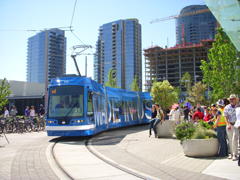In the March 22 issue of The Hill, Rep. Nick Rahall (D-WV), ranking member of the House Transportation and Infrastructure Committee, gave a real world example of the loopholes currently being exploited in “Buy America” laws:
Last July, workers at a Chinese state-owned company in Shanghai loaded four 5,300-ton steel modules onto a ship bound for California, to complete the largest public works project in that state’s history.
These enormous steel structures embarked on a 22-day journey across the Pacific Ocean as part of a $6.3 billion project — replacing a portion of the San Francisco-Oakland Bay Bridge. In total, 43,000 tons of steel for that project, paid for by American taxpayers, bear the “Made in China” stamp.
You read that right. Billions of U.S. taxpayer dollars are funding steel jobs in China. Politicians can talk all they want about shoring up the manufacturing industry and creating new jobs, but Rahall was able to show how our own policies are hurdles on the track leading to increased U.S. competitiveness.
TTD and our affiliates support efforts to make much-needed investments in our ailing transportation infrastructure. However, this money should not only modernize the transportation system, but also help support a robust American manufacturing sector and create jobs here at home.
That’s why TTD supports legislation championed by Rep. Rahall, the Invest in American Jobs Act (H.R. 3533), to strengthen, harmonize and appropriately expand existing Buy America provisions to ensure that American dollars are supporting American jobs.
TTD addressed this issue earlier this month at our Executive Committee meeting: the need to fix gaping loopholes in “Buy America” requirements, so that America’s bridges don’t have to be “Made in China.” And thanks to Sens. Sherrod Brown (D-OH) and Jeff Merkley (D-OR), these provisions are strengthened and the loopholes closed in an amendment they pushed in the Senate’s surface transportation bill that is now being looked at by the House. As Rahall says, the U.S. is literally buying bridges and other major transportation infrastructure from foreign competitors, which means we are outsourcing American ingenuity and paying others to design, manufacture and transport them.
Closing this loophole and strengthening Buy America should be a top priority for Washington for one important reason: Buy America WORKS. When the requirements aren’t bypassed through segmentation or generously waived by federal agencies, Buy America laws create jobs and give us the greatest bang for our buck.
One great example is United Streetcar, a growing company in Clackamas, Ore., that’s doing wonders for our nation’s manufacturing base. In 2009, the company rolled out the first U.S.-made modern streetcar in nearly 60 years—and now it is expanding into Portland and Tucson.
United Streetcar owes its success partly to Buy America laws, which helped give it the opportunity to bid on these infrastructure projects. As a result, taxpayer dollars are modernizing local transit systems creating jobs for union employees in Oregon, and helping to support over 200 vendors of streetcar parts in 20 states.
But for every United Streetcar, there are many more “Made in China” bridges. Let’s hope a change soon in our own policies will make sure that projects that are paid for by Americans are stamped “Made in America.”
